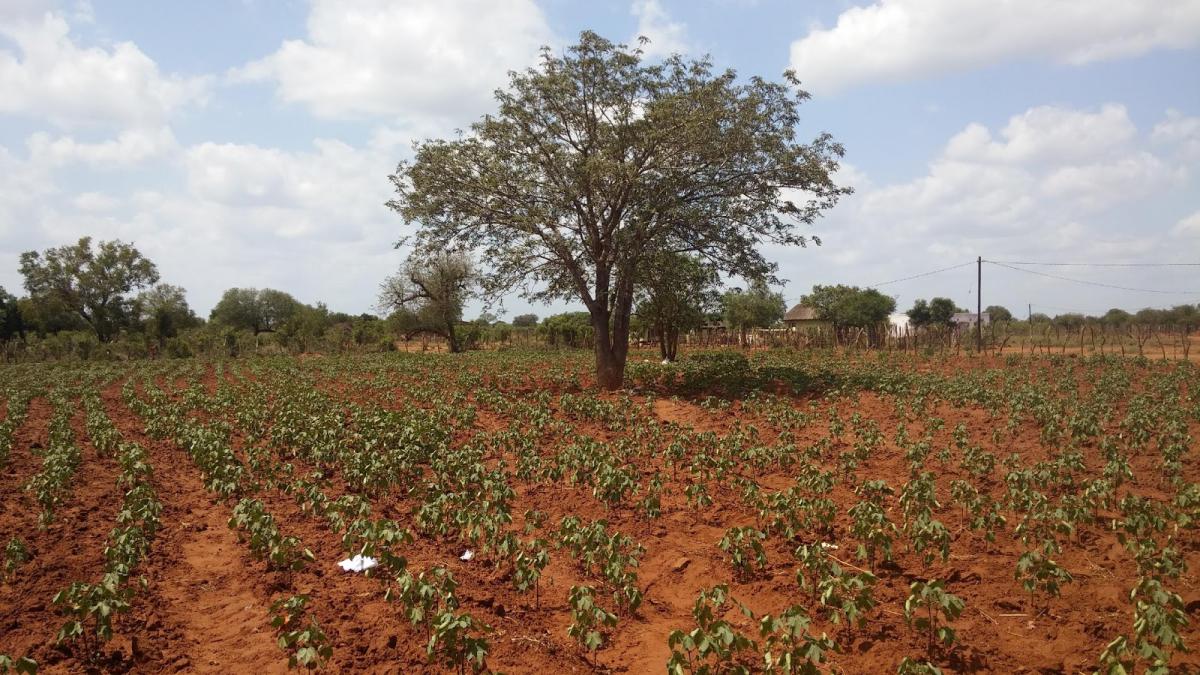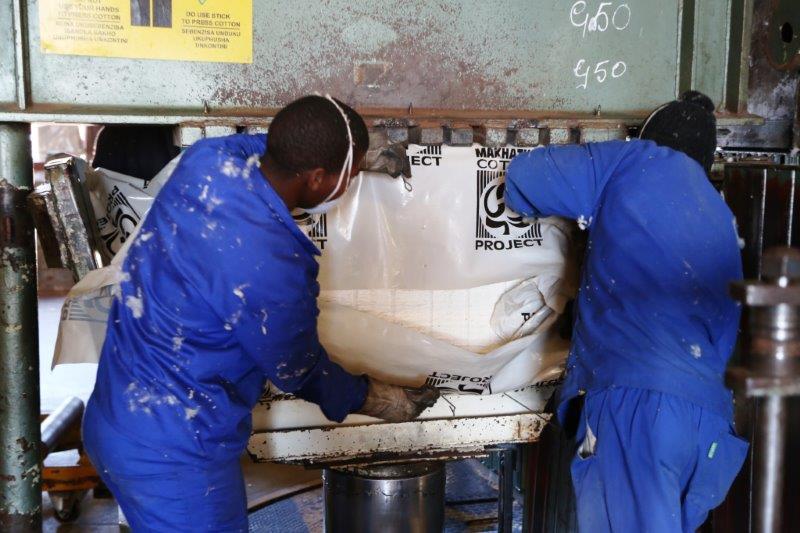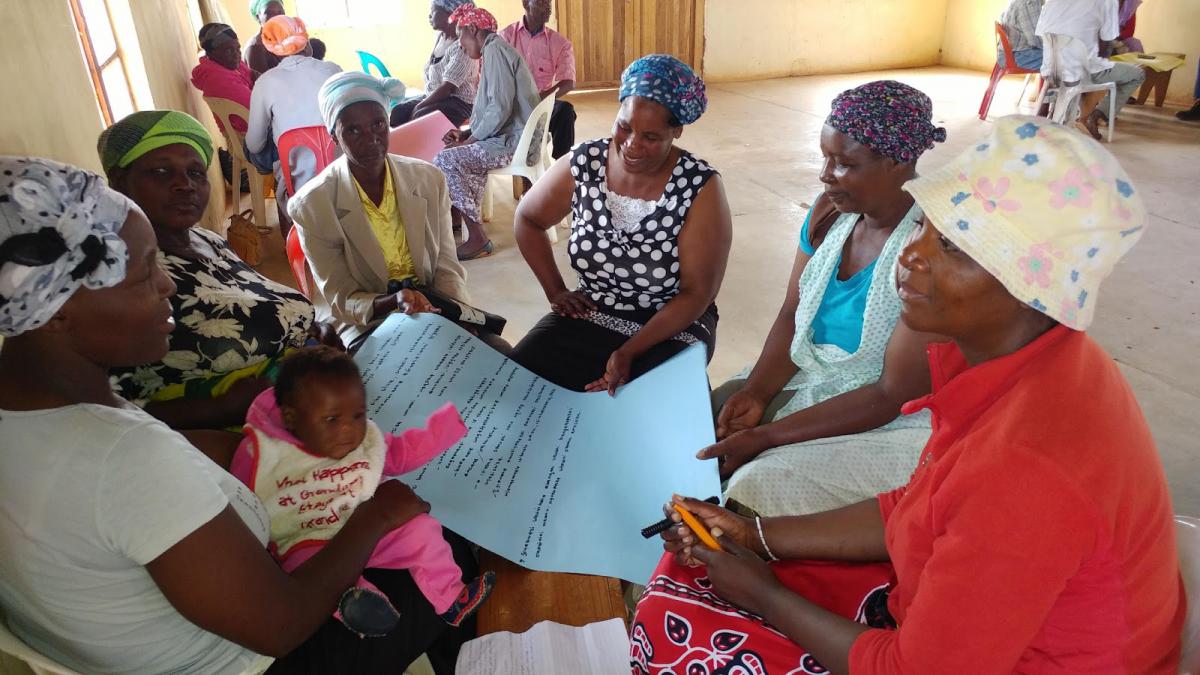
A smallholder cotton farmer’s field in the Makhathini Flats, South Africa
“The BCI project has really opened our eyes,” said Moses, a cotton farmer and chairperson of the Ubongwa Cotton Association in South Africa. “We have really learned a lot and look forward to the next cotton season to put the lessons into practice.”
The country’s Broad-Based Black Economic Empowerment policy, various South African retailers’ responsible sourcing initiatives, and the industry’s recognition that change is urgently necessary are coming together in a concerted effort to rejuvenate the country's flagging cotton sector. From farmers to retailers, several supply chain actors, supported by both government and non-governmental organizations, are participating in the Sustainable Cotton Cluster (SCC), a multi-stakeholder initiative managed by the NGO Cotton South Africa. The Cluster’s objective is to strengthen cooperation throughout the cotton value chain and chart a new roadmap for the industry.
Solidaridad's BCI project with the cotton farmers in Makhathini is part of this new vision for South Africa's cotton sector.

Activities at the Makhathini cotton gin
The Makhathini Cotton Project is led by the Ubongwa Association, a farmer co-operative producing cotton. Established in 1996, 32 cotton farmer associations, in the UMkhanyakude and Zululand district municipalities, came together and formed one umbrella organization, in order to ensure the collective production and processing of their produce. They also operate one of five farmer-owned ginneries in South Africa, which processes the cotton and sells the lint to spinners.
Challenges facing farmers
Farmers, both women and men, of this northern KwaZulu-Natal area are anywhere from in their early 20s to their 90s. While many have no formal education, others are semi-literate or have tertiary qualifications. They face numerous challenges including high input costs, poor yields, low prices for cotton produced, water scarcity, lack of input finance and mechanization.
“Every farmer, on average, plants about two hectares of cotton,” Moses said. “Most of them can’t plant more cotton due to limited mechanization. They have to rent equipment like tractors, and rental costs increase with larger land sizes.”
Cotton is crucial
Nevertheless, for the dry land farmers in this region, cotton is the only viable crop. While they typically also plant vegetables such as beans, butternut squash and maize in the winter, acute droughts in recent years did not allow them to do so. Cotton is also one of very few commodities where local consumption is greater than domestic production, thus creating opportunities for producers to undertake cotton production.
In fact, the Makhathini Ginnery seeks to work with farmers, relevant government agencies and other stakeholders to stimulate cotton production and increase cotton supplies to the gin, which is operating below full capacity. Creating businesses related to other value-added products such as cottonseed oil and cattle feed are also being explored, in order to increase the value obtained from cotton production for the farmers.

Farmers involved in group work as part of BCI Training
As the SCC works towards developing a South African sustainable cotton standard that aligns with both the country’s laws and the BCI standard, Solidaridad is supporting the Makhathini farmers to move towards achieving this goal. Since 2016, Solidaridad has focused on training them in BCI standards, monitoring and evaluating the project’s progress and developing continuous improvement frameworks for smallholder cotton production. Solidaridad is also supporting the digitization of data from the farmer field books to the online platform developed by SCC, in order to increase transparency and improve management and reporting.
Moses is excited about the ongoing BCI training and its potential benefits for farmers. “We have learned so much due to the BCI training during the past year,” he said. “Earlier, we knew nothing about safe management of agri-chemicals, which can be quite dangerous. Now, we know how to handle them properly, while protecting ourselves and the environment. Before the BCI training, we weren't very systematic about our planting activities. Now, we know better and will do it correctly during the planting season this year. We have observed that both quantity and quality of cotton can improve, which is very promising. We are looking forward to this planting season to apply the lessons learned and see how it improves cotton production and our livelihoods.”
New initiatives in Southern Africa
Further, Solidaridad Southern Africa is committed to strengthening learning and collaboration across southern and eastern African nations that are focused on building a more robust and sustainable cotton industry, and therefore, supports the Eastern and Southern African Cotton Organization (ESACO). ESACO is a young organization which brings together stakeholders from the cotton sector in Mozambique, Zambia, Zimbabwe, Malawi, Ethiopia, Kenya, Tanzania and Uganda. It seeks to foster greater regional cooperation to enhance the cotton industry’s performance, competitiveness and sustainability.
The comeback of the cotton sector
Cotton was once considered to be “white gold” in South Africa. However, the country’s cotton producers have suffered significantly over the years. Once an industry with sustained production and high employment capacity, today, cotton is one of the smaller national employers. While sufficient production capacity exists in the country, lower import duties attracting cheap imports of both cotton and cotton products have affected local production. This is coupled with rising fuel and electricity prices, and stagnating exports that have hurt the sector.
Learn more about Solidaridad programmes in Southern Africa
